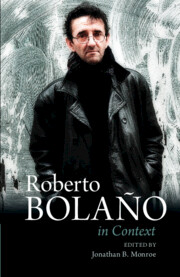Book contents
- Roberto Bolaño in Context
- Roberto Bolaño in Context
- Copyright page
- Contents
- Contributors
- Chronology
- Part I Geographical, Social, and Historical Contexts
- Chapter 1 Mapping Bolaño’s Worlds
- Chapter 2 Chile, 1953–1973
- 3 The Pinochet Era, 1973–1990
- Chapter 4 Dictatorships in the Southern Cone
- Chapter 5 Mexico City, 1968
- Chapter 6 Mexico City, Paris, and Life versus Art
- Chapter 7 Spain, Europe: 1977–2003
- Chapter 8 Transnational Currents: Europe and the Americas
- Part II Shaping Events and Literary History
- Part III Genres, Discourses, Media
- Part IV Aesthetics, Culture, and Politics
- Further Reading
- Index
Chapter 5 - Mexico City, 1968
from Part I - Geographical, Social, and Historical Contexts
Published online by Cambridge University Press: 15 December 2022
- Roberto Bolaño in Context
- Roberto Bolaño in Context
- Copyright page
- Contents
- Contributors
- Chronology
- Part I Geographical, Social, and Historical Contexts
- Chapter 1 Mapping Bolaño’s Worlds
- Chapter 2 Chile, 1953–1973
- 3 The Pinochet Era, 1973–1990
- Chapter 4 Dictatorships in the Southern Cone
- Chapter 5 Mexico City, 1968
- Chapter 6 Mexico City, Paris, and Life versus Art
- Chapter 7 Spain, Europe: 1977–2003
- Chapter 8 Transnational Currents: Europe and the Americas
- Part II Shaping Events and Literary History
- Part III Genres, Discourses, Media
- Part IV Aesthetics, Culture, and Politics
- Further Reading
- Index
Summary
This chapter focuses on how Bolaño’s short novel Amulet (1998) approaches the tumultuous period of Mexico 1968, with its effervescent student movement and the subsequent violent governmental repression that led to the military occupation of the country’s most important university, UNAM, as well as the massacre at Tlatelolco on October 2nd. Through the narration of Auxilio, an Uruguayan poet who remained locked in a women’s bathroom at UNAM during the two week span of the university’s occupation, the novel reconstructs this period yet shies away from a linear, chronological narration with a transparent claim to truth. On the contrary, by intertwining historical facts with fiction, Amulet’s unreliable and anachronistic narrator works against closure, embracing political defeat as a means to propose listening as a form of continued engagement.
- Type
- Chapter
- Information
- Roberto Bolaño In Context , pp. 57 - 64Publisher: Cambridge University PressPrint publication year: 2023

